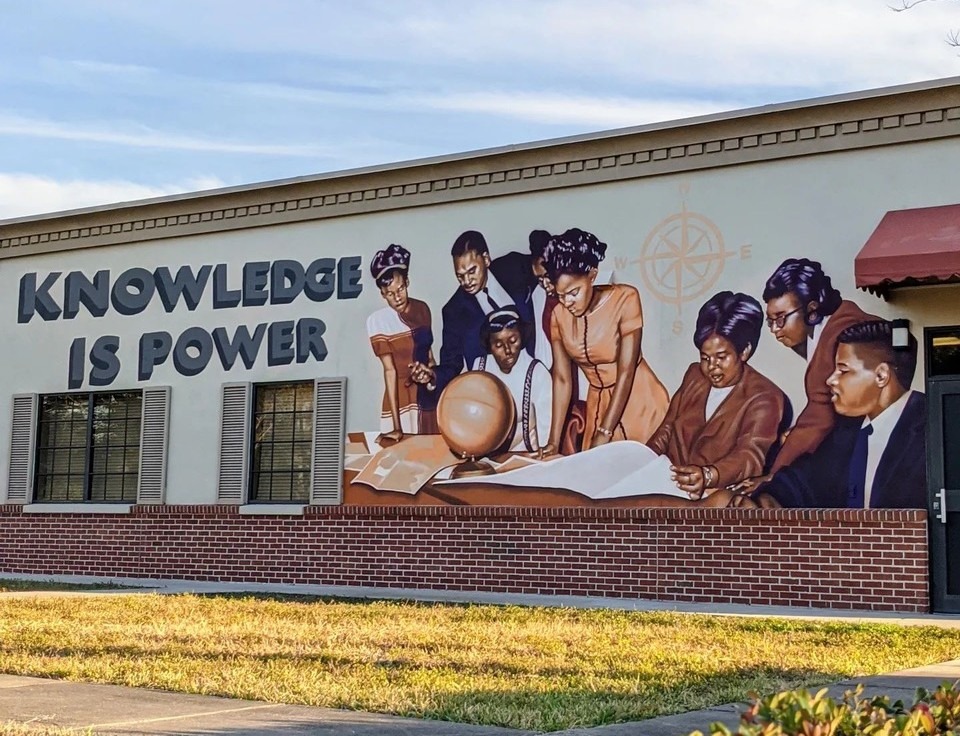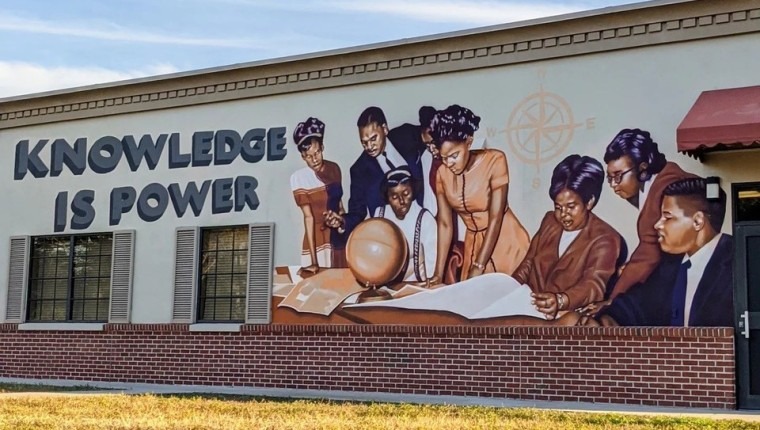By Margo Hammond
. . .
Everything You Ever Wanted to Know About
Childhood Literacy But Were Afraid to Ask
A Community Conversation
. . .
An NEA/Pinellas Recovers Grant Update
These are edited excerpts from a panel discussion at the first annual St. Pete Reads! Lit Fest, hosted November 5 by the Cultured Books Literacy Foundation, the Barbershop Book Club and St. Pete College at the The Woodson African American Museum of Florida.
You can find a range of creative tips from parents on how to help kids learn to love reading – a crucial skill that will help them choose their own path.
. . .
For Parents and Caregivers
of Preschoolers
. . .
Questions by moderator Unisha Bullard are in italics. The other panelists were Tabree Fort, founder of the home pre-school The Learning Fort; Marcus A. Brooks, executive director of the Center for Health Equity, and Ronesha Roberson, speech pathologist and founder of Speechology.
When should I start teaching my child to read?
Fort: Now! You can teach them to read now. You can do small things. In The Color Purple when (Nettie) was teaching Celie how to read, she had the words on the door, on the mirror. That’s called an enrichment environment. You can teach them to read by doing that.
. . .
Roberson: That’s great. I feel learning to read is a process. There are a lot of pre-reading skills that have to happen before children can actually learn to read. So even if your toddler doesn’t know how to read yet, all around us we have letters. You can point out the letters, you are able to start that process in order for your child to learn how to read.
Brooks: I’ve learned unorthodox ways to teach children how to read and learn numbers and letters. I’m a sneaker head — I collect sneakers — and my 4-year-old is also a sneaker head. When he was younger, I thought, Oh my god, I got my kid stuck on sneakers, it’s a problem. But then I learned that he was learning his number through the Jordan numbers of the sneakers. He knows that one is a Jordan 4, he connects that one to a 3, and so he goes to class and that’s the things he recalls.
How often should I read to my child?
Roberson: Studies have shown that if you can read to your child three times a week, that is beneficial for them.
Brooks: I read to my sons often in the evenings before bed. When I come in to read, I’m really animated. It’s a production. I don’t know if they really hear what I’m saying but the value is there and they start to see reading as something that’s actually fun and interesting not something that they have to do.
. . .
Is it okay to not always read books?
Fort: It’s perfectly fine to use your imagination, to create your own story for your child – and it’s really, really important to engage your child and ask him questions from the story or have them put their own input into the story.
Bullard: I love that. Kids like to read the same story over and over. So it’s a good practice to start having them make up their own story.
Fort: Have them write out their own story, even if they can’t write words, have them scribble, and illustrate their own story and when it’s storytelling time, they can read out their own stories to you and you can pick up on the vocabulary that they know.
. . .
What books do you suggest we add to our library for our children?
Fort: Minority children need books they can look at and view themselves in. Representation. It gets the kids to want to read more because they see themselves in these books or Grandma or somebody they recognize.
Brooks: We are at a time where books are being removed and stories are being removed. And the true history of this country is being removed. So how do we combat that?
I do racial equity work for a living so my kids don’t really stand a chance of being anything other than aware culturally. But (it is important to tell) the stories through the lens of the people who actually lived them and not the stories of the victors.
. . .
Roberson: From a Black mom’s perspective, definitely I look for books that my kids can see themselves in.
From a speech pathologist’s perspective I like to recommend that parents have books that rhyme. It really helps with language development, putting that foundation down for learning to read later on. Books that rhyme, books that repeat.
A good one that is also diverse is Please Baby Please by Spike Lee. It repeats a lot. It helps a lot in learning to talk and learning to read later on.
. . .
Bullard: I’m taking this all in because as you can see, I have a baby. so thank you.
. . .
For Parents and Caregivers
of Middle Schoolers
. . .
Questions from moderator Marcus A. Brooks are in italics. The other panelists were author Greg Neri; Sapheria Emani, a first year teacher at St. Pete’s Johns Hopkins Middle School; and Dr. Maurie Lung, founder of Life Adventures for All.
How can I motivate my child to read when I’m not much of a reader myself?
Neri: I always like to say I was a serious reluctant reader. Then I came across this book, The Phantom Tollbooth, which had these crazy pictures in it. It was really offbeat and strange. I didn’t know you were allowed to do this. And it was really funny too. Like it felt almost like I shouldn’t be reading this. Crazy stuff that feels like you’re in on it.
. . .
For me there’s a book for everybody. It doesn’t matter who you are or how much you think you don’t like reading or you haven’t seen that book yet. For me it’s all about taking that journey, finding those books that connect with you. Every book is not for everybody. But there is definitely a book for you. Whoever you are.
Emani: When I became a teacher, I had to learn to meet my students at their level, to give them reading that was actually going to engage them.
It’s the same thing with parents. It’s okay if you’re not engaged but where are your children at? Meet them at their level, give them those resources. There are activities in the community that you can get involved in which are not reading per se but the focus goes back to that. Like this festival.

Lung: I make sure that my kids see me reading. I was an avid reader as a kid but my kids aren’t all avid readers. So I try to sneak things in. I might be cooking and ask a kid to read a recipe to me. Or when we’re going grocery shopping, I ask, How many kinds of cereals can you tell me about? Or when we’re in the car, I ask who can find a sign that has a word that rhymes with frog?
The other thing is to encourage the habit of reading. There’s lots of studies that show that reading is the one piece that makes a difference in school success. So every night we take 20 minutes where we all just sit as a family and read sometimes. One of my triplets really appreciates the Captain Underpants graphic novels. I try not to read them but he really loves them and I think he really loves that I’m slightly uncomfortable with them so that is engaging.
. . .
We also make a big deal about reading. On their fifth birthday they got their library cards and we dressed up and it was a whole event. I told them you can check out as many books as you can carry, which to younger kids was super empowering.
Part of it is not to get stuck on the idea that we have to read this book, for this amount of time, for this academic reason – but give them opportunities to read all the time.
Neri: To me the library is very important. The fact that my daughter can check out 20 books at once, that act of just exploring. You can go through all of them until you find the one or two that you want to read, then you come back and get 20 more.
Lung: My nine-year old just got into mysteries, like Nancy Drew. The stuff where he can pay attention as he goes along and solve it. He loves when he figures it out before he gets to the end.
. . .
My child is in middle school and not a confident reader. What should I do?
Neri: Some kids discover books earlier, some discover books later.
Lung: Representation matters. My kids want to see their family in books. Coming from a queer family, my 9-year-old was concerned to talk about his family on the first day of school this year because he thought I was going to be arrested when he got home from school.
That’s the part that legislators don’t understand. When you have that fear and you’re not seeing yourself or your family in what you’re reading, that can be an important part of the problem as well.
Brooks: My 8-year-old is really into Pokemon. Every book he wants to read is Pokemon. I’m making him read like, you know, The Miseducation of the Negro, Thurgood Marshall and he says, like, “This sucks,” but he’s going to know his Black history.
But I’m always trying to figure out, Hey, how do you make sure what he is consuming is also supporting whatever he’s got going on? How do we support what their interests are yet introduce them to things that align with our values?
. . .
Lung: If they’re reading on their own, let them read whatever they’re reading. We can be curious about what they’re reading, One of mine was into the Pokemon too, So I had them write a book – “Pokemon Had a Bad Dream” or “Pokemon Goes to School.” We have a hundred of those titles now. But then when I’m reading out loud, I’m going to read some of those other things.
Also reinforce reading books. I know it’s bedtime but I see you’re reading so I’m going to give you another 10 minutes. But if its bedtime and they’re on their iPad, it’s iPad off.
Neri: Leave books stranded around the house.
Brooks: I say my 4-year-old doesn’t like to read, but he likes when his brother reads to him.
Maybe what I’ve shared with him just hasn’t clicked yet, and so I should stop saying that he’s not a reader. We do that from time to time, begin to make comparisons. Then kids start to say, “I’m not a reader.” So it’s important to be really intentional as parents and say, “You are a reader.”
. . .
Cultured Books Literacy Foundation
is a recipient of the Pinellas Recovers Grant,
provided by Creative Pinellas through a grant from the
National Endowment of the Arts American Rescue Plan.
. . .



